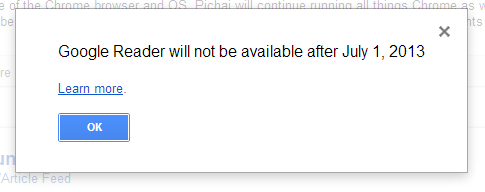Google’s decision to kill its Reader Web app (and the widely used, never supported API behind it) is a major bummer for RSS devotees. But the company’s decision to kill the beloved product doesn’t just affected newsfeed hounds; its impact reaches anyone who uses any Google apps at all. In announcing Reader’s shutdown, Google said that “usage of Google Reader has declined, and as a company we’re pouring all of our energy into fewer products.”
Okay, then. Google Reader may well still have been popular, even if less so than it once was, and that would still qualify as usage that had “declined.”
So whether you were a Google Reader fan or not, the key questions are: Whichother Google services are on the chopping block? Which ones either see their popularity on a similar decline, or just aren’t profitable enough?
Put another way: If Google is willing to kill its products, should we feel safe using them? The answer is complicated.
The most assuredly safe apps
Google search and Gmail aren’t going away. Each of those apps is strongly tied to Google’s core business: Selling ads. Google wants to know what you’re searching for so that it can show you relevant ads, and it wants to know what’s in your inbox so that it can show you relevant ads. And remember too that Google doesn’t just show you ads related to your messages while you’re navigating your inbox; it can remember your interests (based on past emails and searches) across the Web as you surf and encounter more Google ads.
Google’s ads make up the bulk of Google’s income. Search and Gmail make its ad business work. They’re safe.
And believe it or not, that means thatGoogle Maps is pretty safe, too. Google Maps incorporates ads as well.
Probably safe
There’s no direct way that Google makes money from its free Google Docsoffering. (Google Docs has now mostly been subsumed by Google Drive, but Google still uses the Docs name in some places, and so shall I.) Even though Google Docs is ad-free, the service still seems important to Google’s broader business goals. Google wants us to live on the Web, to eschew desktop software wherever possible. Without Google Docs, the company’s new Chromebook Pixel has no obvious word processor.
And even if the Pixel turns to pixie dust, Google Docs remains important to Google, in some small part, because it helps the search giant compete with Microsoft just a smidgen more. That’s the same reason you likely needn’t fear the impending demise of Google Calendar.
Google+ still has a future; it probably won’t follow Google Buzz and Google Wave into the Google Grave. That’s because Google’s bet big on its social network, even though users haven’t embraced the service with much enthusiasm yet. The good signs are that—unlike Google Reader—Plus isn’t a service that Google’s been mostly neglecting; new features and updates are pushed with consistency. And Google doesn’t appear ready to cede to social web to Facebook, which elevates Plus’s importance considerably.
Though Google doesn’t need to build its own Web browser, it’s unlikely thatChrome is going anywhere. There are numerous reasons why, but here are two big ones: First, given that the bulk of Google’s businesses are Web-based, it makes sense for the company to find ways to control the experience of accessing those services where it can. And second, when Google searchers use other browsers to search, Google pays out a piece of its ad revenue to those browser vendors. Searches made through Chrome thus save Google money, since it needn’t cut other browser makers in on the loot.
Outlook uncertain
There’s no reason to panic in the streets about Google Voice, but it’s hard to see precisely what’s in it for Google, either. The company does charge for international calls, but for years, it’s kept calling free within the U.S. and Canada. One key advantage Google’s VOIP and phone management service offered the company was a means by which it could test and refine its voice recognition technology by transcribing voicemails, but that seems less important in an era with Google Now on many mobile devices.
It’s also hard to feel entirely confident in the future of Picasa, Google’s photo sharing service. It’s never been as beloved a service as something like Yahoo’s Flickr, and Flickr is prime evidence that even belovedness doesn’t necessarily lend itself to massive success. The Picasa business model, of paying monthly storage fees for larger photo collections, just doesn’t mesh with how Google usually makes money. Though Picasa has its fans, it certainly feels like a service that could be cut as Google culls its less-popular offerings. And given that Google seems to be pushing Picasa traffic to Google+, the service may well really belong in the next category:
Doomed
Feedburner’s future’s so dim, it could stare straight at the sun with impunity. In giving up on Google Reader, the company has made it clear that it’s no longer focused on RSS feeds. Thus, its oft-neglected service for tracking RSS feed stats just doesn’t seem long for this world.
And it’s difficult to imagine Google’s other social network, Orkut, hanging around too much longer. Yes, the service remains hugely popular in a couple of countries—notably Brazil and India, which combine to make up nearly 90 percent of the site’s traffic. But it’s hard to imagine Google wanting to maintain a service that’s never made any headway with users in most countries—particularly when it has another social network in Google Plus, with a larger and more global user base.
How to proceed
Listen, if you’re not paying for a service—any service—you need to recognize that it could vanish or change dramatically with little notice. While I don’t think you need to worry about finding a search alternative today, it is worth internalizing that nothing lasts forever, especially Google products.








